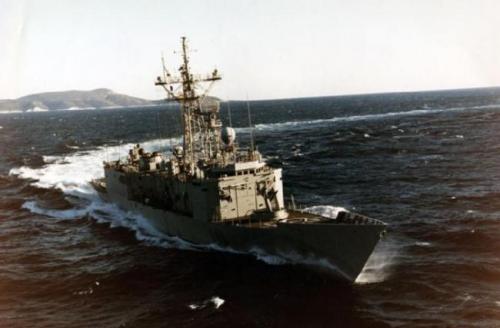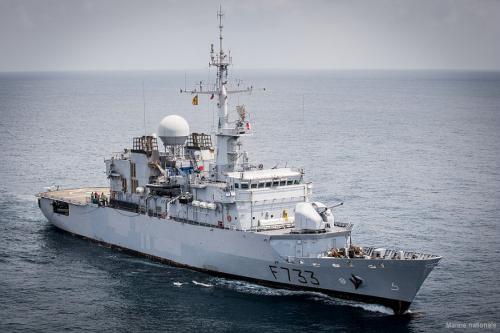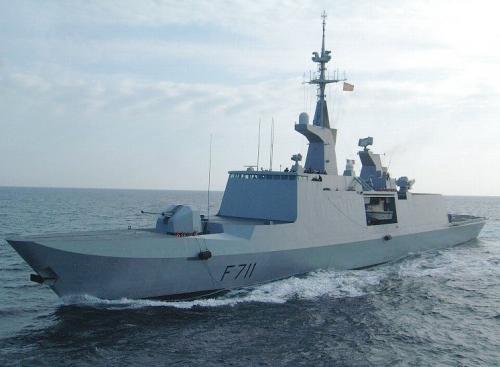
The challenge was not only to take over the responsibility of handling from scratch the logistics of, maybe, the most successful operation in the EU’s history. Also, the relocation of the Headquarters had no precedent in the history of the EU and it included the transfer to Brest of the Maritime Security Centre for the Horn of Africa, as part of the Operational Headquarters.
Only a few days later, on the 21st of April, the fishing vessels FV Adria and FV Txori Argi were attacked by suspected pirates in the Indian Ocean, 280 NM off the coast of Somalia. After two days, the combined efforts of the EU NAVFOR’s flagship ESPS NAVARRA and MPRAs German JESTER and Spanish CISNE, under the coordination of Atalanta’s OHQ permitted to successfully intercept and board the dhow being used as a mothership.
Since then, Atalanta’s OHQ has seen 498 people from 21 different countries; we have navigated the troubled waters of a world under the effects of a pandemic without compromising the fulfilment of our tasks; we have welcomed the Republic of Korea and Colombia as members of the Operation, thus transcending our European roots; we have bid a (hopefully) “see you later” to the strong German military contribution; we have contributed to the effective eradication of piracy-related incidents since April 2019; we have taken enormous strides towards the goal of becoming a global maritime security provider; we are eager to tackle the responsibility of becoming a fundamental pillar in the EU Maritime Area of Interest in the North-Western Indian Ocean in the framework of the Coordinated Maritime Presences concept and we have continued establishing new landmarks in the completion of our obligations.
In this spirit, the month of April 2022 has become a defining moment in the recent history of Atalanta.
After the early activation of the executive secondary task of fighting drug trafficking by the PSC in February 2022, with the valuable contribution of French assets in direct support to Atalanta under the modality of “catch and release”, Atalanta announced the first interception of a drug cargo when, on 21st March, the French navy’s LHD “Mistral” and frigate “Courbet” seized four tons of cannabis and 97 kilograms of heroin on a stateless dhow.


The month of April has highlighted the immense possibilities of Atalanta to fight this scourge and strike important blows to the funding of terrorist and criminal networks.
On 14th and 15th April, French Navy Surveillance Frigate “Floréal” carried out two drug seizures on two stateless Dhows (respectively off the waters of the Kenyan/Tanzanian border and East of Seychelles), that, cumulatively concealed close to 650 kg of methamphetamine and over 850 Kgs of heroin. Hardly in the lapse of the following 48 hours, other two stateless Dhows (off the waters of Mogadishu and off Haradere) were intercepted by the same ship with, respectively, 171.3 Kgs of heroin and 24.4 Kgs of hashish and 346.6 Kgs of methamphetamine.

Between 26th and 28th April, the same Frigate “Floréal”, apprehended almost 6 tons of hashish during three new actions on flagless ships. Unlike the four previous seizures along the “Smack Track”, these last three operations were conducted along the “Hash Highway”, another main drug route of the Western Indian Ocean linking the Arabian Sea to the Gulf of Aden.


With these three interdictions, the total number of anti-narcotics operations carried out by the French Navy Surveillance Frigate “Floréal” stands at seven since April 14th, bringing the total to more than eight tons of seized narcotics. The estimated economic impact of these actions is close to 250 million € in average street value in European cities (according to values provided by the United Nations Office on Drugs and Crime - UNODC). This money will not feed criminal and terrorist networks.
This frenzy of actions teaches us two lessons: the immense possibilities of Atalanta to play a decisive role as Maritime Security Provider and the need to secure a solid “legal finish” that may serve as deterrent for this kind of crimes in a very near future in view of the foreseeable scenario when Atalanta will not be in conditions of counting on the support of French assets under the “catch and release” modality. For this purpose, we count on the valuable support of the EEAS.
The month started under the sad news of the communication by the German Military Representation to the EU and NATO that Germany would discontinue its military participation in Atalanta from 30th April 2022. The departure of three out of four of our German staff members marks the end of Germany’s significant military contribution to Atalanta after almost 14 years. Germany is keeping its civilian contribution unchanged.
The authorization of the German parliament for the Bundeswehr to participate in Atalanta expired last 1st April and, due to Atalanta’s success in its fight against piracy, Germany already had gradually reduced the deployment of assets in direct support. Eventually, the non-renewal of UNSCR against piracy and a sudden new priority - the war in Ukraine - had made a renewed parliamentary approval highly unlikely.

Since December 2008, the German Armed Forces had participated in Operation Atalanta with an impressive contribution.
Naturally, the German Navy took most of the commitment. The frigate “Karlsruhe” was the first German warship in 2008, and in 2016 the frigate “Bayern” was the last German flagship permanently deployed to Operation Atalanta. The Bayern was also the last German frigate in Associated Support in the beginning of last February.
Since 2008 until 2016, the German navy had sent 16 frigates, 1 corvette, 1 Task Force replenishment vessel, and 2 oilers to the Horn of Africa, most of them for several times. In Atalanta they have accumulated a total of 3,180 days of duty at sea. (This is still the second most contribution in Atalanta’s history.) From 2011 until April 2021, German navy aviation also had deployed Jester, an Orion P-3C, to Djibouti, where Germany had established a logistic base.
Three times, in 2011, 2014 and 2016, a German rear admiral has been the Force Commander, and twice the Operation’s Deputy Commander in 2015 and 2020. In the OHQ, German officers have held seven CJ3, seven CJ5, five FOPS and 14 CJ6 ACOS and DACOS positions. 22 German watch keepers and watch keeper assistants have done their duty in the JOC. Nine German soldiers have served in the media section. In addition, civilian Bundeswehr personnel had worked as LEGAD for eight times and for eleven times in CJ8 positions.
For now, we can only wish that one day Germany will rejoin Operation Atalanta. German soldiers will be always welcome again.


After the official visit of the Operation Commander to Djibouti from 16th to 17th March, on 6th April, the Deputy Operation Commander, French Navy Rear Admiral Slaars, participated in the Djibouti – EU Political Dialogue, co-chaired by the Djiboutian Foreign Affairs Minister, H.E. Mahamoud Ali Youssouf and the Head of Mission of the EU Delegation in the country, Mr. Aidan O’Hara. The Operation expressed its views about its positive impact in Djibouti economic activity by securing maritime areas and fighting piracy. We appreciated the positive perception by the Djiboutian host that referred to Atalanta’s role as “essential” to provide protection to the maritime traffic in the area.

During his tour in Djibouti, the Deputy Commander had the opportunity to pay a visit to the Spanish Orion Detachment, the key air component of the Operation, where he hosted the Deputy Head of Mission of the Spanish Embassy accredited to Djibouti and resident in Ethiopia. Both highlighted the paramount contribution of this detachment to the accomplishment of Atalanta’s mandate.

On 25th April, the Ambassador of Japan in Spain, H.E. Kenji Hiramatsu, together with the Japanese Defence Attaché and First Counsellor of the Embassy, were received by Atalanta’s Operation Commander as part of a wider visit to the Rota Naval and Air Base. The Ambassador and the Operation Commander reviewed the outstanding relation between Atalanta and Japan.
Atalanta is enjoying close operational interactions with the Japanese Self Defence Force (JSDF) at sea as well as with the JSDF facilities in Djibouti. The Operation Commander visited their premises in two occasions during the last year: August 2021 and March 2022. Both parties interact on daily basis exchanging information via the Mercury system. Japan also attended the 49th SHADE conference as part of the Combined Maritime Forces.

Atalanta and the Japanese Navy have a long tradition of performing joint exercises, being the last occasions in October 2021, with a trilateral exercise at sea with Japan and the Omani Maritime Security Centre were Atalanta assets engaged with JNS “Yugiri” on boarding practices, cross-deck landings and a joint patrol; January 2022, on a PASSEX with JNS “Yuudachi” and February 2022 when JNS “Yuudachi” provided support to Atalanta during Focussed Operation ARTIC TERN. The EU is intending to conclude a MoU with Japan in order to facilitate future exercises. After OHQ draft and inputs, since December 2021, the EEAS is following the process for approval by the Japanese counterpart.
On 11th April, Captain Badar Mohammad Al Bu Saidi, from the Royal Navy of Oman joined a meeting on board ESPS “Canarias”, moored in the Omani port of Duqm, where he shared with the Commanding Officer common strategies on fighting piracy and criminal activities in the West Indian Ocean. Both sides concurred that working towards Maritime Security is a main contribution for the development of the region.

On 12th April, Italian Navy Rear Admiral Fabrizio Bondi, Force Commander of Atalanta visited the ESPS “Canarias” in the Omani port of Duqm, closing ties with the crew members and expressing his satisfaction for the performance of both ships under his coordination.
On 19th April, the Commanding Officer of the ESPS Canarias paid a visit to the Head of the Djiboutian Naval Forces, Colonel. Ahmed Daher Djama, highlighting the Operation’s commitment to cooperate with regional partners in the area.
On 23th April, building on many years of communication with the Government of Somali Federal Member State of Puntland, the Force Commander, held a virtual meeting with Mohammed Iman, Director General of the Department of Security and Disarmament, Demobilization and Reintegration. Both actors engaged in identifying prospects of cooperation against all forms of illegal maritime activities. Virtual Key Leader Engagements developed after the COVID pandemic serve to partially mitigate the constraints imposed by the health measures. Atalanta will continue dedicating its efforts to support al States in Somalia under the principle of territorial integrity and respect to the sovereignty of the country.
On 28th April, Combined Joint Task Force Horn of Africa soldiers along with Atalanta crew members took part in a combined training session, sharing procedures and lessons learned, reinforcing the ties among strategic partners that share common goal of international security.
Besides the Force Command flagship, Italian frigate ITS “Bergamini” (since 17.03.2022) and the Maritime Patrol and Reconnaissance Aircraft CISNE, these assets have temporarily reinforced the Operation in Direct Support, i.e. under control of the Force Commander, or in Associated Support, when the asset remains under national command. From top to down, Spanish frigate ESPS “Canarias” (in Direct Support since 17.03.2022), French frigates FS “Floréal” (in Direct Support since 11.04.2022) and FS “Surcouf” (in Associated Support since 26.04.2022), and the French minehunter FS “Orion” (in Associated Support until 01.04.2022).



The Indian National Maritime Foundation and the EU project ESIWA (Enhancing Security Cooperation In and With Asia) invited Atalanta’s specialist staff to an online EU-India seminar on maritime security and UNCLOS, held on 11th April, with the participation of Greece. As this year will mark the 40th anniversary of the adoption of the 1982 United Nations Convention on the Law of the Sea (UNCLOS), the objective of this seminar consisted in fostering better understanding of respective Indian and European perspectives on maritime law, that could then pave the way for potential greater convergences, synergies and interactions on the international scene.
Also, the ESIWA project organised on 12th – 13th April a seminar on maritime security in collaboration with the RIDU (Republic of Indonesia Defence University). An exchange on this topic was agreed by the EU and Indonesia as a deliverable during the two last EU-Indonesia Security and Defence Dialogues held respectively in October 2020 and November 2021, being the question of the “Legal Finish” one of the main items in the agenda. The organisers agreed that Atalanta is obviously the main EU actor involved in this domain and, under that condition, Atalanta’s Legal Advisor delivered a presentation about its experience.
The French Embassy in Seoul co-organised with the think tank KIMS (Korea Institute for Maritime Strategy) a Maritime Security Cooperation Forum on 19th April in a hybrid format and in the context of the French Presidency of the EU Council. The objective of this forum was dedicated to maritime security, enhancing mutual understanding of interests, strategies and activities of both the Republic of Korea, France, the EU and EU Member States, and encouraging the exchange of experience and expertise and identifying opportunities for cooperation on topics of mutual interest. Atalanta Operation Commander delivered a presentation about the Operation’s experience in the context of the newly adopted EU Strategy for Cooperation in the Indo-Pacific that calls for more joint activities with Indo-Pacific partners to promote maritime security in the region.

Our OHQ celebrated with the representatives of our contributing nation the Dutch National Day on 27th of April, which commemorates the King’s Day. The commitment of contributing states is paramount for the good success of Atalanta in the way ahead and we can only have words of gratitude towards their professionalism and engagement.